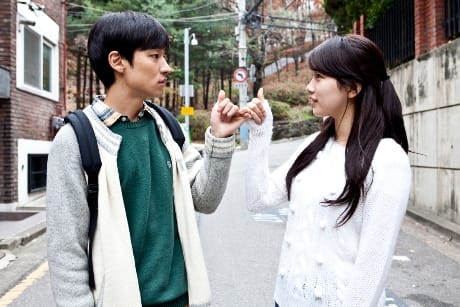Architecture 101 is a thoughtful, tender film about many things—nostalgia, memory, time, longing and connection—though ostensibly it is about first love.
Thirtyish architect Seung-min (Tae-woong Uhm) is commissioned by Seo-yeun (Ga-in Han), a former college classmate in his introduction to architecture course, to build her a house. While Seung-min initially seems to feign remembering Seo-yeun, through a series of beautifully interwoven flashbacks to the 1990s we witness what transpired between these two individuals (played by Je-hoon Lee and Su-ji Bae).
The film juggles back and forth between the present and the past with ease. While Seung-min spends time with the exacting Seo-yeun, trying to draft her ideal home, we spend time with their younger selves as they complete architecture assignments together (e.g., tour your neighbourhood and take pictures of the alleys and buildings you normally fail to notice), becoming something more than friends.
Cultural artifacts (Pentium processors, Discmans, mousse, etc.) help to recall another era and to reveal how products and people change. But the difference between the past and the present is best expressed in the most mundane of details. In returning to her childhood home, Seo-yeun is baffled by the pencil marks on the wall that demarcate her growth—how was she ever so small? She has difficulty reconciling who she is now with who she was then as well as understanding all that has transpired between these two temporal bookends.
Architecture 101 is concerned with time—how quickly it moves, how inconceivable it is not just that you were once so different physically but also mentally and emotionally, how strange it is that the people you were once inseparable from now exist as little more than memories. In searching out Seung-min, whom she hasn't seen since attending Architecture 101 classes, Seo-yeun grapples with the notion that someone who was her closest companion currently lives a life in which she plays no discernible role.
Yong-joo Lee, writer/director of Architecture 101, allows recollection and nostalgia to expose the attachment we have for the people, places and objects that have shaped our identity. The more painful or unresolved a memory is, the more vivid and inescapable its impact.
The film remains authentic to its thesis from start to finish, neither confusing wistfulness with sentimentality nor indulging its viewers' desire for a fairy tale ending. Like life, Architecture 101 is not tidy—words and thoughts go unexpressed but not unknown—but this doesn't make it maudlin.
Despite recognition that life does not turn out as expected and that curiosity over how life might have been different can never be appeased, Architecture 101 still manages to foster appreciation over the marvel of merely being alive.
Architecture 101 screens on Sunday November 11th at 8:15pm at the Royal theatre.
(Lotte Entertainment)Thirtyish architect Seung-min (Tae-woong Uhm) is commissioned by Seo-yeun (Ga-in Han), a former college classmate in his introduction to architecture course, to build her a house. While Seung-min initially seems to feign remembering Seo-yeun, through a series of beautifully interwoven flashbacks to the 1990s we witness what transpired between these two individuals (played by Je-hoon Lee and Su-ji Bae).
The film juggles back and forth between the present and the past with ease. While Seung-min spends time with the exacting Seo-yeun, trying to draft her ideal home, we spend time with their younger selves as they complete architecture assignments together (e.g., tour your neighbourhood and take pictures of the alleys and buildings you normally fail to notice), becoming something more than friends.
Cultural artifacts (Pentium processors, Discmans, mousse, etc.) help to recall another era and to reveal how products and people change. But the difference between the past and the present is best expressed in the most mundane of details. In returning to her childhood home, Seo-yeun is baffled by the pencil marks on the wall that demarcate her growth—how was she ever so small? She has difficulty reconciling who she is now with who she was then as well as understanding all that has transpired between these two temporal bookends.
Architecture 101 is concerned with time—how quickly it moves, how inconceivable it is not just that you were once so different physically but also mentally and emotionally, how strange it is that the people you were once inseparable from now exist as little more than memories. In searching out Seung-min, whom she hasn't seen since attending Architecture 101 classes, Seo-yeun grapples with the notion that someone who was her closest companion currently lives a life in which she plays no discernible role.
Yong-joo Lee, writer/director of Architecture 101, allows recollection and nostalgia to expose the attachment we have for the people, places and objects that have shaped our identity. The more painful or unresolved a memory is, the more vivid and inescapable its impact.
The film remains authentic to its thesis from start to finish, neither confusing wistfulness with sentimentality nor indulging its viewers' desire for a fairy tale ending. Like life, Architecture 101 is not tidy—words and thoughts go unexpressed but not unknown—but this doesn't make it maudlin.
Despite recognition that life does not turn out as expected and that curiosity over how life might have been different can never be appeased, Architecture 101 still manages to foster appreciation over the marvel of merely being alive.
Architecture 101 screens on Sunday November 11th at 8:15pm at the Royal theatre.
